- Home
- Hugh Howey
Molly Fyde and the Parsona Rescue tbs-1 Page 2
Molly Fyde and the Parsona Rescue tbs-1 Read online
Page 2
The enemy never saw what hit him. The missile impacted the cockpit right where the glint of visor had been. Molly had hoped to disable the craft, but she did much more. The kinetic energy of the oncoming ship forced the missile down its center, rupturing the rear of the vessel and sending out large chunks of debris. The destruction occurred so close to her Firehawk that her tail was forced to one side. The violence slammed her into her harness, and Molly fought with the flight controls to keep out of a spin.
After a tense moment, she regained full control of the ship.
Her ship.
Molly elbowed Cole, whooping with delight, but the life support readouts showed her the awful truth: She was alone.
The thruster indicators went from amber to green.
Molly gave them a test, feeling the acceleration add more weight to an already heavy chest. Out of immediate danger, she took a moment to survey the flow of battle on SADAR. The blue and green dots were no longer approaching one another in separate spheres. They intermingled, swirling in pairs until one of them disappeared.
Her side fought nobly, but the three sets of flanking craft were closing in for what would soon be a massacre. And there wasn’t much Molly could do to help.
Then she thought of how many times she’d toyed with these scenarios in her bunk at night. Here she was, at the helm, hopelessly outgunned, with nothing in the Navy manuals to suggest her next course of action.
She should run. Her wingman was gone, her pilot dead. She would score points with the higher-ups simply for surviving—for saving Navy hardware. But something gnawed at her. She couldn’t help but wonder if there was something she could do for the fleet, something that would win her the accolades she felt she deserved. Would an act of creative heroism prove what she already knew? That she more than belonged out here with the boys?
The choice seemed simple: fight or flee, but Molly’s hand came off the throttle. She wouldn’t be thrusting in either direction. Instead, she started spinning up the Firehawk’s hyperdrive.
She wondered what “the boys” would make of this next idea.
They’d probably tell her she’d lost her mind. By every standard of common sense, jumping through hyperspace during a battle was the height of folly. Hyperspace was useful for crossing vast distances instantaneously, but only if you were careful. There were two dangers—Molly was about to flirt with them both.
The first danger was the sensitive mathematics involved. To travel through hyperspace safely, you had to account for every object on both sides of the jump. Even a small gravitational disturbance could deflect you off course, or worse, suck you in. It was likened to tossing one magnet at another; if the same poles were facing, you’d end up repulsed and thrown someplace at random. If the opposite poles were lined up, you’d be forced together violently. Violently, that is, for one of the objects.
And that was the second danger Molly was about to face: Objects in “real” space have dibs—they can’t be dislodged by something else. Try and occupy the same coordinates as even a tiny object, like the millions of chunks of debris surrounding a space battle, and no one would even notice your attempt. You’d just vanish. To where, nobody knew.
Were this not the case, modern warfare would have descended into the hopelessly brutal. An arms race with no deterrent effect would ensue as attackers wiped out any target with known coordinates. All they’d have to do is hyperspace a bomb and enjoy the fireworks. The results would be instantaneous and anonymous.
This was widely considered to be a viable terror tactic until 2138. That’s when a video recording from “The Luddites” was discovered in an abandoned apartment. It seems the anti-technology organization had launched a massive suicide-bombing campaign across planet Earth. All for naught. The entire group had vanished in a puff of unexplained physics, leaving behind a taped rationalization for an action that never took place, just a group of crazies that up and disappeared.
These were the dangers. Navy instructors only had to go over them once. After that, everyone just knew not to try what she was contemplating. It was a basic, simple rule, one of the first they were taught.
But her fleet faced certain destruction, pops of orange violence bursting in the distance as her wing mates succumbed to superior numbers. Cole and Riggs were gone. There was no one there to talk sense into her. And by the moment, she was growing convinced her Firehawk had been sabotaged, tampered with. She was living on borrowed time, which made suicidal risks suddenly worth calculating.
Checking her SADAR, Molly saw a pocket of space between the two remaining enemy craft flanking her fleet. Treating the combined mass of every ship on one side of this point as a single object, she simplified the math and made an approximate calculation. Crossing one set of fingers, Molly punched in the hyperspace commands with the other. It was her second game of chicken in less than a minute.
Once again, she didn’t hesitate.
••••
The stress of entering hyperspace was topped only by the pain of leaving it. The nausea and panic attacks engendered by a successful jump were likened to a bombardment of loud bass sounds. Many pilots never developed an immunity to the discomfort, and Molly was one of them. She often fought to hide the severity of her reaction. This time, however, she reveled in it.
The pain meant she was alive.
But a glance at her surroundings didn’t inspire much hope for remaining this way. She stood between the fleet and the two flanking ships, and they were closing in fast. Their lasers lanced out greetings at her unexpected arrival. Molly flinched, shoving the ship sideways and away from the attack. She powered up the glorious thrusters and raced parallel to her fleet, presenting a target that moved side to side.
The cape and sword gambit would never work with these guys. There were two sets of crossing laser fire to avoid. And surely they were aware of their fallen comrade by now, which meant she couldn’t rely on them underestimating her. This last assessment was confirmed as each enemy craft spat out a missile keyed to her ship’s signature.
Molly took the gesture as a compliment.
She keyed up her defense menus and scrolled to the missile chaff.
Four pods were stowed in the rear of her Firehawk, each capable of emulating her ship’s signature. Dropping one at a time should negate this new threat, but the delay would prevent her from protecting the fleet. Precisely what her enemy intended.
When the chaff menu came up, Molly appreciated the sophistication with which their Firehawk had been sabotaged. This was a high-level hack. “Drop” was selectable from the chaff menu, but not the “arm” command. It meant they were as useless as her missiles. Dead weight. And trying to place one of the dud canisters in the path of a homing missile would be like flipping a coin in front of a passing laser bolt.
Molly cursed and pulled on the flight stick, sending her Firehawk back on an arc toward the two ships. Their incoming missiles altered course slightly to hone in on her. There was no way she could out-maneuver them; the missiles could pull as many Gs as it took to track her down. She was limited by biology and her flightsuit.
Dwelling on her own constraints gave Molly another crazy idea. She recognized the old Tchung ship designs they were up against. If the missiles were Tchung as well, they had a design flaw she could exploit: their homing software was slightly more advanced than their thrusters. They could think faster than they could turn. Normally, this wasn’t a problem, as it required extreme velocities before the limitation became a factor. Besides, most targets are wise enough to move away from missiles, so the flaw rarely revealed itself. But it was there.
Molly came about as sharply as she could, forcing out puffs of air against the Gs. She pushed forward on the accelerator. Once again, she was prepared to stand in doom’s path in an attempt to escape it. Cole’s stillness made it easier—she was only gambling with her own life.
Molly shook her head and focused outside the cockpit’s carboglass. Beyond the two incoming missiles, she watched her prey s
peed toward her fleet. They weren’t wasting time following up the missiles with laser-fire. She was a minor annoyance compared to their primary objective: reaching the Navy’s unguarded rear. They had batted at her as if she were a fly while they stalked a heftier foe.
She wished she had time to appreciate the skill behind the tactics, but the missiles and her ship were closing on each other too fast for her to get distracted. Molly just hoped it was fast enough. She did more dirty math. Her suit could take around 40 Gs; her body could probably withstand a dozen more. She looked at her current rate of acceleration and came up with twenty degrees—that was as much as she could alter direction at these speeds without crushing her brain against the inside of her skull. It wasn’t a large vector change; she’d have to wait until the very last second, fraction of a second, even.
That sort of timing required as much luck as skill. The window was so small, the delay between thinking and doing could get her killed. She’d have to take this into account, somehow. Her left hand twitched slightly in awkward anticipation. Molly wished Cole was the one trying this.
The missiles were nearly upon her, or she was almost on them. Her danger-sense warned her prematurely—screaming at Molly to alter course now. She fought the urge, waiting until it felt too late. Only then did she issue the command to her left hand, feeling it move a millisecond later.
The nose of the Firehawk deflected up the programmed twenty degrees. The missiles vanished from view past the carboglass of her cockpit. Her body was pummeled by the radical shift in gravities.
Molly tensed up, partly to protect herself from the violent force of dozens of Gs, and partly in anticipation of a sudden death.
The corners of her vision turned black. The blood in her brain forced itself into her chest. The ring of darkness tightened until she was peering through a straw.
Molly Fyde passed out.
2
When she came to, Molly feared the battle was already over. But before she could shake the fog out of her brain, she realized she’d only been out a few seconds. The two missiles were still out there—seeking her ship’s signature. SADAR confirmed this as a curving line that had zipped right past her and was now pulling around toward her new vector, the missiles so close to one another they may as well have been one.
Molly straightened her ship back up and raced off for the enemy craft. The precision of the missile attack had saved her. If either projectile had lagged behind the other, she would’ve dodged the first and eaten the second. For the second time, her enemy’s accuracy had meant her salvation.
At full thrust, she chased down the two ships and took a moment to survey the flow of battle. Her side wasn’t doing half-bad to be so outnumbered. The additional sets of flankers posed the biggest threat as they worked their way around the other sides of the fleet. Her squad mates finally moved to head them off, their slower response negating their functioning weapons systems. They would be too late to do anything about the encirclement, while Molly and Cole had been swift enough but too powerless.
It appeared the Navy forces would be wiped out in a battle for the ages, but it might take longer than Molly initially thought. It was enough to force a grim smile, as sick and sore as her body felt. The Navy geeks that enjoyed scoring these encounters would have a blast with this one.
She returned her focus to the ships ahead of her and the lovely, zooming gifts they’d left behind. She brought up the nav calculator, temporarily comforted by her usual duties. The thrill of playing “pilot” had been tempered somewhat by the pressure of being responsible. A small part of her missed the warm embrace of being a role-player. I’ll do my simple tasks and let someone else risk failing, she thought, then pushed it to the back of her mind. She needed to concentrate on the numbers.
Three moving objects. It was a word problem flight instructors would adore. They’d be able to phrase it so no pilot would understand what in hyperspace was going on. Molly knew better than to make this more confusing than it needed to be. There were really two different problems here, and each could be solved individually.
First, she plotted the speed and direction of her ship and the two flankers. This gave her the coordinate in space at which they would meet if she kept gaining on them. Next, she did the same for her Firehawk and the missiles speeding toward her thrusters. This gave her another set of coordinates. She hoped the first point in space would be nearer than the second, giving her a chance to hurt them before they hurt her.
But the plots didn’t show that. In fact, Molly thought she’d done something wrong. Only a single nav result showed up on her display. She started to run the calculations a second time when she recognized the improbable: both problems had the same solution. She would reach her enemy at the precise moment their missiles reached her. A ship overtaking two ships, being overtaken by their projectiles.
Molly had another thought: Maybe this wasn’t a bad thing.
With the gap between her and the two craft ahead dwindling, she only had half a minute to prepare for impact. She pulled the defense menus up one more time and drilled down to the useless chaff screen. She might not be able to arm them, but maybe she could give her ship a bit of a buffer. It helped that the flankers were now in firing range of the fleet. Distracted with laser-fire from the Navy, they weren’t keeping a vigilant eye on their rears. Molly and the two missiles zipped down their wake, all three players set to meet at a single point.
Worst-case scenario: the missiles take her out just as she arrives between the other two ships. The blast would vaporize her, but it should also take her foes out of the fight. If she ended up with three dead bogeys after entering a battle with no offensive capabilities, Molly would consider it a victory of the highest order.
The best-case scenario was too much to wish for, but it had all four of her chaff canisters deploying and the missiles making impact, saving her cockpit from the blast and directing the force to the enemies on either side. It was yet another bold stunt with slim chances, but Molly decided to keep gambling while she was on a lucky streak.
As she entered the thruster-wash of the enemy, she placed her thumb over the release button. Time slowed to a silent crawl. The laser fire ahead of the flankers seemed to spurt forward like drips of red molasses. Everything moved so slowly that none of it appeared threatening, as if she could reach out and just pluck the hot plasma from outer space.
And then she was there, riding the wake of the two ships, buffeted in their thruster-wash. Her thumb twitched a command, releasing the useless chaff.
The missiles made impact, an orange glow wrapping its silent arms around her Firehawk.
And for the second time that day, Molly’s world went black.
••••
“Molly.”
It was Cole’s voice.
Her vision returned, the black in front of her visor opening like a camera’s iris to reveal the battle raging ahead. Their Firehawk was still partly intact, the protective shell of a cockpit drifting through space with twisted hunks of metal trailing behind. Her life support readout indicated that she was dead.
“Damnit!” Molly slammed a fist into the flight controls, hurting her hand more than she did the simulator.
Cole reached his gloved hand over and patted her thigh, trying to comfort her. “What’re you so upset about? You did good, girl. Those other two ships caught most of the blast. They’re goners.”
Molly glanced at Cole. A smirk peeked out below his visor. She smiled back, a bit reluctantly. “Huh. I guess you’re right. I was hoping I’d keep getting lucky. What the hell happened to you?”
Cole tried to shrug his shoulders in the flight harness. “I dunno. The simulator said I was dead, so I must’ve been. Didn’t make sense from the damage we sustained, but nothing about this exercise makes sense. Oh, and by the way, my suit ignored the fact that I was lifeless and gave me the same Gs you took in that missile maneuver. Remind me to beat your ass later.”
She pouted. “Yeah? Did Cole get a tummy ac
he?”
Cole laughed and the joke lingered in the cockpit for a few minutes. On the screen, the remainder of their fleet tried in vain to stave off defeat. Gradually, the humor faded, and they started asking more questions. Serious questions. They went back to the conversation they were having before the exercise went hot, Molly more open this time to Cole’s conspiracies.
When the last Navy ship tried to flee, there were still seven fully functional enemy craft left for the mop-up. The cadets wouldn’t find out until the debriefing which race they were up against today, but Molly already suspected the Tchung. More tax dollars spent training against a non-enemy, a race no one had seen for generations.
The last Navy ship was surrounded, creating a traitorous feeling of anticipation. The end of this exercise would bring relief. Being dead and having to watch her fellow cadets struggle to extend the inevitable made Molly’s entire body twitch. It was like her right hand trying to pilot from the nav side of the cockpit. Finally, with a puff of orange pixels, the battle was over. The panorama of carnage went black, and one horror replaced another: the summation screen showing the casualty and damage reports. It wasn’t supposed to be a scoreboard, or taken as a game, but that’s how the students saw it. All but one of them were boys. Comparing anything measurable was their favorite pastime.
Molly scanned the list from top to bottom. Jakobs/Dinks sat on top with 2.5 confirmed kills, which meant one of their enemy had taken damage from another crew. They also had a wingman assist and a tactical bonus for recognizing the flow of battle and reacting properly. Subtracting their eventual death left them with 550 points. Not too bad a score, considering.
Down at the very bottom was Cole/Fyde with zero kills, an unassisted wingman penalty, three tactical violations, and a self-kill. With a score of -2080 rendered in bright red, it made everyone else look like they knew what in hyperspace they were doing.

 Refuse (The Silo Archipelago Series Book 1)
Refuse (The Silo Archipelago Series Book 1) Second Suicide: A Short Story
Second Suicide: A Short Story Machine Learning: New and Collected Stories
Machine Learning: New and Collected Stories The Walk Up Nameless Ridge
The Walk Up Nameless Ridge Half Way Home
Half Way Home The Plagiarist
The Plagiarist Peace in Amber
Peace in Amber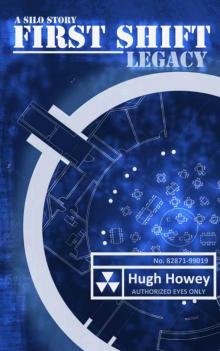 First Shift: Legacy
First Shift: Legacy Wool
Wool Glitch
Glitch Shift
Shift Dust
Dust Molly Fyde and the Land of Light
Molly Fyde and the Land of Light The Shell Collector
The Shell Collector Third Shift: Pact
Third Shift: Pact Molly Fyde and the Fight for Peace
Molly Fyde and the Fight for Peace Sand Omnibus
Sand Omnibus I, Zombie
I, Zombie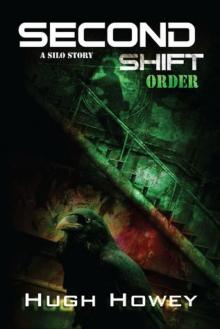 Second Shift: Order
Second Shift: Order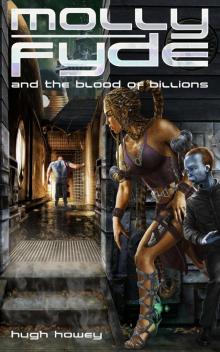 Molly Fyde and the Blood of Billions
Molly Fyde and the Blood of Billions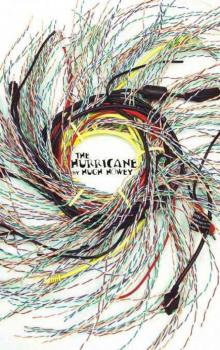 The Hurricane
The Hurricane The Box
The Box Glitch_A Short Story
Glitch_A Short Story Molly Fyde and the Land of Light tbs-2
Molly Fyde and the Land of Light tbs-2 Machine Learning
Machine Learning Resist
Resist Second Shift - Order (Part 7 of the Silo Series) (Wool)
Second Shift - Order (Part 7 of the Silo Series) (Wool)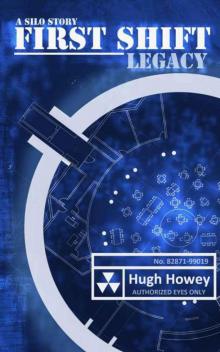 First Shift - Legacy s-1
First Shift - Legacy s-1 Stories on the Go: 101 Very Short Stories by 101 Authors
Stories on the Go: 101 Very Short Stories by 101 Authors Second Shift - Order s-2
Second Shift - Order s-2 The Robot Chronicles
The Robot Chronicles Molly Fyde and the Blood of Billions tbs-3
Molly Fyde and the Blood of Billions tbs-3 Molly Fyde and the Parsona Rescue tbs-1
Molly Fyde and the Parsona Rescue tbs-1 Molly Fyde and the Fight for Peace tbs-4
Molly Fyde and the Fight for Peace tbs-4 Sand
Sand The Walk Up Nameless Ridge (Kindle Single)
The Walk Up Nameless Ridge (Kindle Single) Wool Omnibus Edition (Wool 1 - 5)
Wool Omnibus Edition (Wool 1 - 5) The World of Kurt Vonnegut: Peace in Amber
The World of Kurt Vonnegut: Peace in Amber The Alien Chronicles
The Alien Chronicles Glitch: A Short Story (Kindle Single)
Glitch: A Short Story (Kindle Single) Second Suicide: A Short Story (Kindle Single)
Second Suicide: A Short Story (Kindle Single) Shift (silo)
Shift (silo)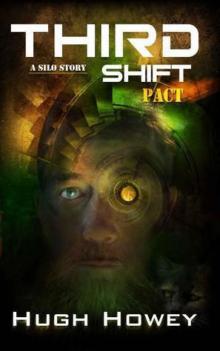 Third Shift - Pact
Third Shift - Pact Dust s-9
Dust s-9 First Shift - Legacy (Part 6 of the Silo Series) (Wool)
First Shift - Legacy (Part 6 of the Silo Series) (Wool)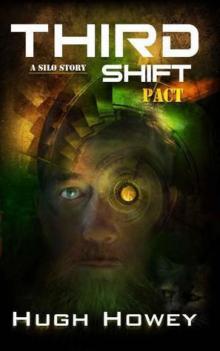 Third Shift - Pact s-3
Third Shift - Pact s-3 Sand: Omnibus Edition
Sand: Omnibus Edition The Box: A Short Story
The Box: A Short Story